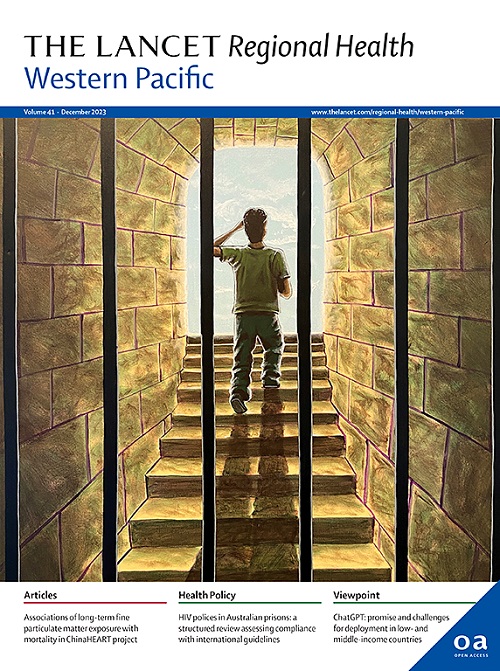Sentinel lymph node biopsy using dye alone in patients with initially cN1 breast cancer and ycN0 status after neoadjuvant therapy: a multicenter diagnostic trial
IF 7.6
1区 医学
Q1 HEALTH CARE SCIENCES & SERVICES
引用次数: 0
Abstract
Background
Given the known complications associated with axillary lymph node dissection (ALND) and the limited application of radiolabeled colloid tracking in China, dye-only sentinel lymph node biopsy (SLNB) is proposed as a feasible and alternative surgical treatment strategy for patients with initially clinically node-positive (cN1) breast cancer to a clinically node-negative (ycN0) status after neoadjuvant therapy (NAT). However, the clinical diagnostic performance of dye-only SLNB needs further verification.
Methods
We conducted a multicenter diagnostic clinical trial from July 2019 to September 2023 by recruiting 230 patients from 12 participating centers across six provinces in China. Adult women with clinical stage T1-4N1M0 breast cancer and ycN0 status after NAT were eligible. SLNB and ALND were performed sequentially for patients, while a single dye was used to guide sentinel lymph nodes during the operation. The primary endpoint was the false-negative rate (FNR) of SLNB after NAT in women with ycN0 disease. Furthermore, subgroup analyses were conducted by age, body mass index (BMI), the number of SLNs removed and tumor subtype. The trial is registered on www.chictr.org.cn (identifier: ChiCTR1900026929) and www.isrctn.com (identifier: ISRCTN31364289).
Findings
The detection rate of single-dye was 95.22% (219/230). Pathological examinations showed positive lymph node findings in 117 of 230 patients. SLNB was successful in 212 out of the 219 patients (96.80%). The FNR of dye-alone SLNB was 5.98% (7/117; 95% CI, 2.44%-11.94%). Furthermore, the FNR was lower in women under 60 years of age (2.33% vs. 16.13% older than 60 years, P=0.0139), with body mass index under 25 kg/m2 (2.60% vs. 12.5%, P=0.0452), and with four or more SLNs (2.53% vs. 13.16% with fewer than four SLNs, P=0.0358). For HR negative/HER-2 positive cases, the FNR was 0%.
Interpretation
SLNB with dye alone in patients with initially cN1 breast cancer and ycN0 after neoadjuvant therapy resulted in clinically acceptable rate of FNR. When four or more SLNs are detected, patients with age ≤ 60 years, BMI<25km/m2 and Her2-positive would derive additional benefit from dye-alone SLNB.
Funding
This trial was funded by Tackling Key Problems and Serving Local Projects of Liaoning Province (ZF20190006, to BC), National Natural Science Foundation of China (82073282 and 82203873, to AZ) and Joint Fund Project of the Science and Technology Program of Liaoning Province (2023012141-JH3/4600, to AZ).
新辅助治疗后初始为cN1、状态为ycN0的乳腺癌患者的前哨淋巴结活检:一项多中心诊断试验
背景:考虑到腋窝淋巴结清扫术(ALND)的已知并发症以及放射性标记胶体追踪技术在中国的有限应用,纯染料前哨淋巴结活检(SLNB)被提出作为一种可行的替代手术治疗策略,用于新辅助治疗(NAT)后最初临床淋巴结阳性(cN1)到临床淋巴结阴性(ycN0)状态的乳腺癌患者。然而,纯染料SLNB的临床诊断性能有待进一步验证。方法2019年7月至2023年9月,我们在中国6个省份的12个参与中心招募了230名患者进行了一项多中心诊断临床试验。临床分期为T1-4N1M0期的成年女性乳腺癌,并在NAT后处于ycN0状态。患者依次行SLNB和ALND,术中使用单一染料引导前哨淋巴结。主要终点是患有ycN0疾病的女性在NAT后SLNB的假阴性率(FNR)。此外,根据年龄、体重指数(BMI)、sln切除数和肿瘤亚型进行亚组分析。该试验在www.chictr.org.cn(标识符:ChiCTR1900026929)和www.isrctn.com(标识符:ISRCTN31364289)上注册。结果单染料检出率为95.22%(219/230)。230例患者中,病理检查显示淋巴结阳性117例。219例患者中有212例(96.80%)SLNB成功。单色SLNB的FNR为5.98% (7/117;95% ci, 2.44%-11.94%)。此外,60岁以下、体重指数低于25 kg/m2(2.60%比12.5%,P=0.0452)、4个及以上sln(2.53%比13.16%,小于4个sln, P=0.0358)的女性FNR较低(60岁以上2.33%比16.13%,P=0.0139)。对于HR阴性/HER-2阳性病例,FNR为0%。研究结果表明,在初始为cN1、新辅助治疗后为ycN0的乳腺癌患者中,单用slnb染色可获得临床可接受的FNR率。当检测到4个或更多sln时,年龄≤60岁、bmi≤25km/m2和her2阳性的患者将从单独染料SLNB中获得额外的益处。本试验由辽宁省重点攻关与服务地方项目(ZF20190006, to BC)、国家自然科学基金项目(82073282和82203873,to AZ)和辽宁省科技计划联合基金项目(2023012141-JH3/4600, to AZ)资助。
本文章由计算机程序翻译,如有差异,请以英文原文为准。
求助全文
约1分钟内获得全文
求助全文
来源期刊

The Lancet Regional Health: Western Pacific
Medicine-Pediatrics, Perinatology and Child Health
CiteScore
8.80
自引率
2.80%
发文量
305
审稿时长
11 weeks
期刊介绍:
The Lancet Regional Health – Western Pacific, a gold open access journal, is an integral part of The Lancet's global initiative advocating for healthcare quality and access worldwide. It aims to advance clinical practice and health policy in the Western Pacific region, contributing to enhanced health outcomes. The journal publishes high-quality original research shedding light on clinical practice and health policy in the region. It also includes reviews, commentaries, and opinion pieces covering diverse regional health topics, such as infectious diseases, non-communicable diseases, child and adolescent health, maternal and reproductive health, aging health, mental health, the health workforce and systems, and health policy.
 求助内容:
求助内容: 应助结果提醒方式:
应助结果提醒方式:


